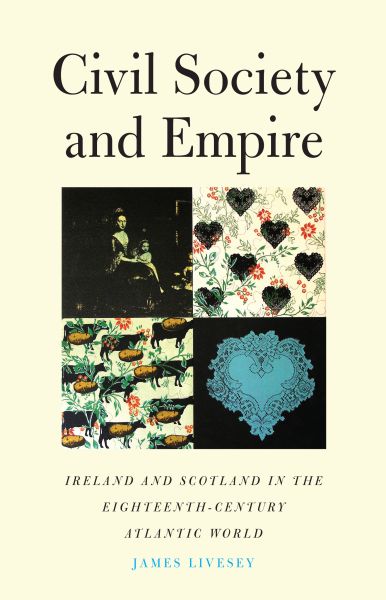 From Jim Livesey comes an interesting-looking book on the origins of civil society. If I were Tyler Cowen I would say it was self-recommending, but in fact Jim recommended it to me directly. (Although we’ve never met, Jim represents the vanguard of the Blackrock Road school of history, philosophy, social science, science, and public policy — an admittedly hazy entity constituted mostly by him and his brothers.) The concept of “civil society” was in the ascendancy after 1989 and was everywhere in the social sciences and political talk by the late 1990s. Livesey’s book argues that the idea has roots in the defeated provincial elites of Scotland and Ireland, as a way for them “to enjoy liberty without directly participating in the empire’s governance”. I could probably have done with reading this two weeks ago, before I kicked off my social theory seminar with a quick and cheery survey of the situation of social theory prior to the nineteenth century, the sort of thing that gives real historians heart failure.
From Jim Livesey comes an interesting-looking book on the origins of civil society. If I were Tyler Cowen I would say it was self-recommending, but in fact Jim recommended it to me directly. (Although we’ve never met, Jim represents the vanguard of the Blackrock Road school of history, philosophy, social science, science, and public policy — an admittedly hazy entity constituted mostly by him and his brothers.) The concept of “civil society” was in the ascendancy after 1989 and was everywhere in the social sciences and political talk by the late 1990s. Livesey’s book argues that the idea has roots in the defeated provincial elites of Scotland and Ireland, as a way for them “to enjoy liberty without directly participating in the empire’s governance”. I could probably have done with reading this two weeks ago, before I kicked off my social theory seminar with a quick and cheery survey of the situation of social theory prior to the nineteenth century, the sort of thing that gives real historians heart failure.
{ 9 comments }
Chris Brooke 09.04.09 at 1:15 pm
Is it mostly about agricultural shows? (I’d be very happy if it were mostly about agricultural shows.)
alex 09.04.09 at 7:10 pm
Bloody interesting bloke, Jim. My meatspace alter-ego holds him in high regard as an intellectual historian.
Patrick S. O'Donnell 09.04.09 at 10:30 pm
I wonder whether or not these alternative “roots” of civil society (the ‘bourgeois public sphere’) took the same or similar form to their (later?) counterparts elsewhere in Europe (e.g., Britain, France and Germany in Habermas’s stylized account) namely, as bourgeois coffeehouses, salons, “table societies,” and so forth.
I’m also curious to what extent, if any, the book might rely on “genetic” and/or post hoc ergo propter hoc arguments (which need not be fallacious). This was prompted by the following from the book’s summary at the link to the publisher’s page: “Livesey demonstrates how western governments, for example, have appealed to the values of civil society in their projections of power in Bosnia and Iraq.”
nonesuch 09.05.09 at 4:05 am
I just read “Bowen’s Court” by Elizabeth Bowen, which is obsessed with the Irish provincial elite, I wonder if it figures in this book, I look forward to reading it. Bowen’s Court is interesting – bit long. Found it more arresting than the bits of her fiction I’ve read thus far, need to try more of the fiction. Haven’t been gripped as of yet.
alex 09.05.09 at 11:31 am
Dunno, Pat, maybe you could read it?
Patrick S. O'Donnell 09.05.09 at 12:05 pm
al,
I plan to. Perhaps others have already read the book.
Jim Livesey 09.05.09 at 5:53 pm
Pat, always happy to find another person who still cares about questions of method in intellectual history. As it turns out this book doesn’t really need too much scaffolding. People like Keane and Kaldor all acknowledge that the concept, in the form we still use it, was put together in the eighteenth century. No need for any complicated argument about causality, agency for ideas or path dependency when the theorists ask you for a grounded account of where they got their concept. One of the things I’m most anxious to do in the book is to separate accounts of association, a technique for putting together any kind of complex social system, from civil society, which is a way of describing the norms for associations. So the coffee house stuff (and all that wonderful stuff about agricultural shows, sorry Chris) is really secondary to the argument.
There is a more systematic debate to be had about responses to Cambridge School intellectual history, but one thing at a time.
Patrick S. O'Donnell 09.05.09 at 6:34 pm
Jim,
Thanks for providing a further introduction to and clarifying comments about your book. I look forward to reading it.
chris 09.07.09 at 10:49 pm
I wonder if I am the only person so old as to find this usae of ‘civil society’ a bit confusing. In the god/bad old days, the phrase sinply meant a political society.
Comments on this entry are closed.